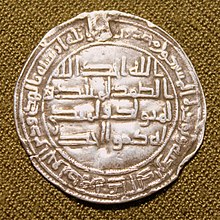al-Ichlās
Al-Ichlas ( Arabic الإخلاص, DMG al-iḫlāṣ 'Faith without reservation' [ alʔixˈlɒːsˁ ]) is the 112th sura of the Koran and one of its shortest.
It consists of four verses ( ayat ) and deals with the concept of Tawheed (oneness of God). Because of its content, this sura is also called "Tawheed" and because of the name God used there, "samad" . Often the first verse is used to denote the entire sura.
Ichlas means "devotion, faithfulness, sincerity, loyalty". The word does not appear in this sura, but serves as a kind of table of contents. What is meant by this word is "the religious attitude of those 'who focus their faith entirely on God'". The question of whether al-Ichlas is a Meccan or a Medinan sura is controversial. In the official Koran edition of the Azhar (1924) it is referred to as Meccan. In the Islamic Koran studies , however, it is often understood as Medinan because the content was understood as Mohammed's answer to a question from the Jews there about the nature of God.
Along with the opening sura al-Fātiha , the sura is one of the best-known suras and is often part of the ritual prayer ( salat ) in Islam .
Text of the sura
The following poetic version comes from Friedrich Rückert (1788–1866). After the Basmala ("In the name of Allah, the Most Compassionate, the Most Merciful!") Follows:
“Say: God is one, (1)
one eternally pure, (2)
has not begotten and no one has begotten him, (3)
and there is no one like him. (4) "
The rhyming prose can also be found in the original Arabic text:
« قُلْ هُوَ اللَّهُ أَحَدٌ
اللَّهُ الصَّمَدُ
لَمْ يَلِدْ وَلَمْ يُولَدْ
وَلَمْ يَكُن لَّهُۥ كُفُوًا أَحَدؙۢ »
"Qul huwa llāhu aḥad
allāhu ṣ-ṣamad
lam yalid wa-lam yūlad
wa-lam yakun lahu kufuwan aḥad"
meaning
In verse 1 the monotheistic principle of Islam is underlined. The verse also reflects the Jewish creed Shma Yisrael from Dtn 6.4 EU . Verse 3 is interpreted as a rejection of the Christian conception of the sonship of Jesus Christ . The meaning of the word “samad”, which is a Hapax legomenon, is explained differently by Koran exegetes and it is also controversial in Koran research.
When the Umayyad caliph ʿAbd al-Malik had Islamic coins minted for the first time in 697 , they bore the text of the sura on the reverse. The sura also appears in three of the four surviving inscriptions on the Dome of the Rock built by ʿAbd al-Malik .
In popular belief, the sura is also assigned a protective function. In Morocco this sura serves as an amulet against the evil eye , provided it has been written down by a young man by the name of Muhammad or Ahmad .
literature
- Arne Ambros: The analysis of Sura 112 - reviews, syntheses, new approaches , Der Islam, Volume 62, Issue 2, 1986, pp. 219–247
- Edwin E. Calverley: The Grammar of Sūratu ʾl-Ikhlāṣ. In: Studia Islamica 8 (1957), pp. 5-14
- Theodor Nöldeke : History of the Qorāns . 2nd edition, edited by Friedrich Schwally . Leipzig 1909.
- ikhlāṣ . In: The Encyclopaedia of Islam . New Edition. Brill, suffering. Vol. 3, p. 1059
Web links
- Al-Ichlas - Pronunciation trainer for recitation (English, Arabic)
Individual evidence
- ^ Translation: Rudi Paret
- ↑ See Lamya Kandil: The Sur names in the official Cairin Koran edition and their variants . In: Der Islam , 69, 1992, p. 43 ff., P. 54.
- ↑ Rudi Paret: The Koran . Commentary and Concordance. P. 530.
- ^ Theodor Nöldeke : History of the Qorāns . Vol. 1. p. 107.
- ↑ Dirk Hartwig: The 'original contract': a rabbinical discourse in the Koran . In: Dirk Hartwig, Walter Homolka, Michael J. Marx, Angelika Neuwirth (eds.): “In the full light of history”. The science of Judaism and the beginnings of Koran research. ERGON Verlag, 2008. p. 191. ISBN 978-3-89913-478-0 .
- ↑ Rudi Paret: The Koran . Commentary and Concordance. P. 530, with further sources.
- ^ Josef van Ess: Theology and Society in the 2nd and 3rd Century Hijra. A History of Religious Thought in Early Islam. Volume I. Berlin / New York 1991, p. 10.
- ↑ Cf. the literary reference in N. Maḥfūẓ in the novel Between the Palaces (Chapter 1): “She knew much more about the world of demons than about the world of men, and so she had never lost the feeling of it not living alone in a big house… Nothing could help but speaking the Fatiha and the Samadija ”(translation by D. Kilias).
- ↑ August Fischer: Deification and tabooing of the names of Muhammad among Muslims . In: Richard Hartmann, Helmuth Scheel (Hrsg.): Contributions to Arabic studies, Semitic studies and Islamic studies . Leipzig 1944. p. 326.
| Previous sura: al-Masad |
The Koran | Next sura: al-Falaq |
| Sura 112 | ||
|---|---|---|
|
1 2 3 4 5 6 7 8 9 10 11 12 13 14 15 16 17 18 19 20 21 22 23 24 25 26 27 28 29 30 31 32 33 34 35 36 37 38 39 40 41 42 43 44 45 46 47 48 49 50 51 52 53 54 55 56 57 58 59 60 61 62 63 64 65 66 67 68 69 70 71 72 73 74 75 76 77 78 79 80 81 82 83 84 85 86 87 88 89 90 91 92 93 94 95 96 97 98 99 100 101 102 103 104 105 106 107 108 109 110 111 112 113 114 |
||

